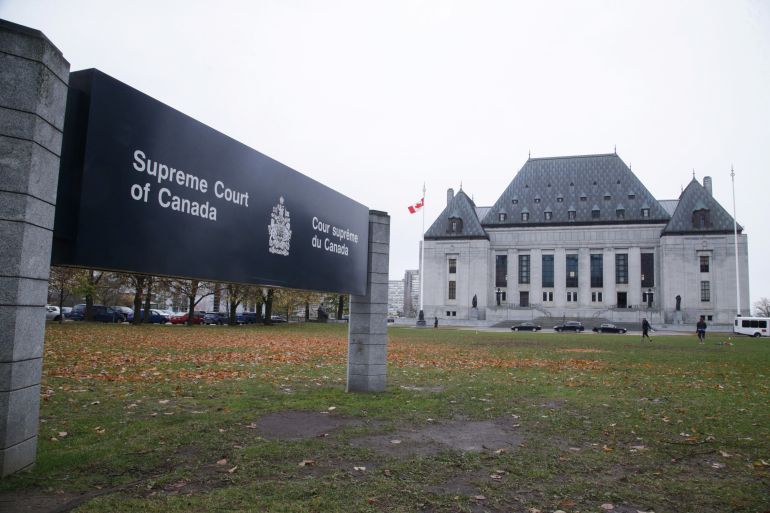Indigenous judge O’Bonsawin nominated to Canada’s top court
Michelle O’Bonsawin’s nomination to be first Indigenous person on Supreme Court of Canada hailed as ‘historic’.

Michelle O’Bonsawin has been nominated to the Supreme Court of Canada, Prime Minister Justin Trudeau announced, in a move that would make the experienced judge the first Indigenous person to ever sit on the nation’s top court.
In a statement on Friday, Trudeau praised O’Bonsawin, who has served as an Ontario Superior Court justice since 2017, as “an accomplished jurist” with expertise in mental health, human rights, labour and employment law.
Keep reading
list of 3 itemsMary Simon is Canada’s first Indigenous governor general
Pope apologises for ‘evil’ of Canada’s residential schools
“Her nomination is the result of an open, non-partisan selection process. I am confident that Justice O’Bonsawin will bring invaluable knowledge and contributions to our country’s highest court,” he said.
The nomination of O’Bonsawin, an Abenaki member of Odanak First Nation, was welcomed as an “amazing” and “historic” move.
FIRST👏🏽INDIGENOUS 👏🏽PERSON👏🏽NOMINATED 👏🏽TO👏🏽THE👏🏽SUPREME👏🏽COURT👏🏽
And an Indigenous woman at that.
Congratulations Michelle O’Bonsawin … what an amazing appointment!! https://t.co/eZxPIdgfLm pic.twitter.com/Avwpmlp8Yv
— Nahanni Fontaine (@NahanniFontaine) August 19, 2022
“Justice O’Bonsawin will be an important voice at the Supreme Court, given her deep knowledge of issues related to Indigenous peoples in Canada,” Murray Sinclair, former chair of the Truth and Reconciliation Commission of Canada, said in a statement.
“The court is made stronger, and our decisions are better, where there are diverse perspectives where they are needed most. This is especially true as it relates to issues facing Canada’s long journey of reconciliation with First Nations, Metis and Inuit.”
In a questionnaire for federal judicial appointments shared by the government, as reported by CBC News, O’Bonsawin said her lived experience as an Indigenous woman helps inform her work.
“My experience as a Francophone Indigenous woman, mother and professional working in the mental health and Indigenous law fields gives me the perspective that Canada is diverse because I am part of that diversity,” she wrote in the questionnaire.
“My experience is a clear example of the rich diversity that makes our country so special to me and my family. My experiences have taught me that discrimination still occurs in Canada, but by being aware of these experiences and through my work in mental health, I believe that I can contribute to making our country a more inclusive society that is fair and just for all.”
History has been made for Indigenous peoples today!
"Michelle O'Bonsawin becomes 1st Indigenous person nominated to Supreme Court of Canada"
It is a good day ✊🏾 https://t.co/1mzlbajFsL— Indigenous Bar – Barreau Autochtone (@IBA_Canada) August 19, 2022
Her nomination came after Canada appointed Indigenous leader Mary Simon to be the country’s 30th governor general last year, making her the first Indigenous person to ever hold the largely ceremonial post.
Last year, Mahmud Jamal also became the first person of colour ever appointed to Canada’s Supreme Court, and Trudeau had faced calls to appoint an Indigenous jurist to the top court, as well.
“Considering the multiple ways that Canadian law is used against Indigenous peoples — as a mechanism for dispossession, cultural destruction and social control — appointing an Indigenous jurist to the highest court would represent a significant step towards addressing Canada’s ignominious legal history,” Toby Goldback, an assistant professor of law at the University of British Columbia, wrote in The Ottawa Citizen in March.
O’Bonsawin’s nomination will go before a special parliamentary committee next week, which will hear about the selection process, Trudeau said in Friday’s statement.
Committee members will then hold a question-and-answer session with O’Bonsawin.
Today, Michelle O’Bonsawin is nominated to the Supreme Court of Canada. A well-experienced bilingual jurist, and an Abenaki member of the Odanak First Nation. A historic moment for the @scc_eng, and for all of Canada. Congratulations, Justice O’Bonsawin. https://t.co/Cj0YjUf1KR
— David Lametti (@DavidLametti) August 19, 2022